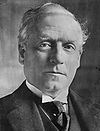fiction.wikisort.org - Writer
Herbert Dixon Asquith (11 March 1881 – 5 August 1947) was an English poet, novelist, and lawyer.[2] Nicknamed "Beb" by his family, he was the second son of H. H. Asquith, British Prime Minister, with whom he is frequently confused[by whom?], and the younger brother of Raymond Asquith.[2]
The Honourable Herbert Asquith | |
|---|---|
 1918 photograph of Asquith | |
| Born | 11 March 1881 Hampstead, London, England[1] |
| Died | 5 August 1947 (aged 66) Bath, Somerset, England[2] |
| Occupation | Lawyer and writer |
| Spouse | |
| Parents |
|
Asquith was greatly affected by his service with the Royal Artillery in World War I.[3] His poems included "The Volunteer" and "The Fallen Subaltern", the latter being a tribute to fallen soldiers. His poem "Soldiers at Peace" was set to music by Ina Boyle. His novels include the best-selling Young Orland (set during and after the First World War), Wind's End, Mary Dallon, and Roon.[2]
In 1910, he married Lady Cynthia Charteris, who was also a writer. She was the eldest daughter of Hugo Charteris, 11th Earl of Wemyss, and his wife, Mary Constance Wyndham.[2] They had three sons.[citation needed]
References
- 1901 England Census
- "Mr. Herbert Asquith – Poet and Novelist". The Times. 8 August 1947. p. 7.
- Guest, Philip; Guest, Wendy (2012). "A Prime Minister and his Family at War: Part II". Siegfried's Journal. Siegfried Sassoon Fellowship. 22 (Summer 2012): 17–23.
External links
 Works related to Author:Herbert Asquith (1881–1947) at Wikisource
Works related to Author:Herbert Asquith (1881–1947) at Wikisource- Profile
На других языках
- [en] Herbert Asquith (poet)
[ru] Асквит, Герберт Диксон
Герберт Диксон Асквит (англ. Herbert Dixon Asquith; 11 марта 1881 — 5 августа 1947) — английский поэт, писатель и юрист. Офицер-артиллерист, участник Первой мировой войны.Другой контент может иметь иную лицензию. Перед использованием материалов сайта WikiSort.org внимательно изучите правила лицензирования конкретных элементов наполнения сайта.
WikiSort.org - проект по пересортировке и дополнению контента Википедии
